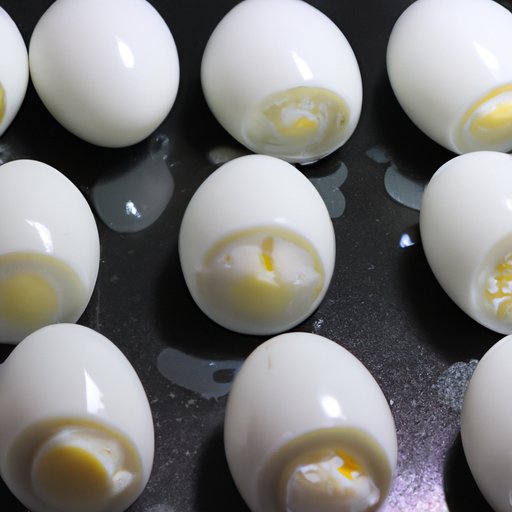
Introduction
Boiling eggs seems like a simple task, but it can be tricky to achieve the perfect boil. Many people struggle with not knowing how long to boil eggs, resulting in undercooked or overcooked eggs. In this article, we’ll provide a comprehensive guide on how long you’re supposed to boil eggs, including timing, temperature, and tips for a perfect boil every time.
A Beginner’s Guide to Boiling Eggs: How Long Should They Cook?
Before diving into the ideal cooking time for different types of boiled eggs, it’s important to note that the timing can vary based on altitude and egg size. Adjusting the cooking time based on these factors will help you achieve the perfect boil every time.
For soft boiled eggs, which are eggs with a runny yolk and partially set egg whites, you should boil them for 4-6 minutes. If you prefer a firmer yolk, you can add an extra minute to the cooking time.
For medium boiled eggs, which have a firmer yolk and set whites, you should boil them for 6-8 minutes.
And for hard boiled eggs, which are fully cooked with a solid yolk and white, you should boil them for 8-12 minutes. If you cook them for too long, the yolks will turn dry and crumbly, so stick to the recommended cooking time for optimal results.
The Perfect Boiled Egg: Timing and Temperature Tips
The key to achieving the perfect boil for eggs is timing and temperature. You should start by adding the eggs to a pot of cold water and bringing it to a boil. Once the water reaches boiling point, reduce the heat to a simmer and cover the pot with a lid. It’s important to keep a stable water temperature throughout the boiling process to prevent undercooked or overcooked eggs.
After the recommended cooking time, remove the eggs and place them in a bowl of ice water to halt the cooking process and make peeling easier. It’s crucial to cool the eggs properly to avoid overcooking them, resulting in a green ring around the yolk.
Science Behind Boiled Eggs: The Chemical Reaction that Occurs While Boiling Eggs
Have you ever wondered why eggs need to be cooked fully? The answer is simple: eggs contain Salmonella bacteria that can cause food poisoning if consumed raw. Cooking the eggs fully kills off the bacteria and makes them safe to eat.
During the boiling process, a chemical reaction occurs inside the eggs that cause them to harden and solidify. Overcooking the eggs can cause a green ring around the yolk, caused by sulfur and iron compounds reacting together.
Cracking the Boiled Egg Code: How to Make Eggs That Are Easy to Peel
One of the most common problems people encounter with boiled eggs is difficulty peeling them. To make peeling easier, try adding a tablespoon of vinegar or baking soda to the boiling water. Alternatively, place the boiled eggs in a bowl of ice water for 10-15 minutes before peeling. These tips will help the shell separate more easily from the egg white and help you avoid that frustrating shell sticking to the egg white.
Four Ways to Tell If Boiled Eggs Are Cooked Perfectly Every Time
Finally, there are several ways to tell if an egg is fully cooked to your desired level. One way is to spin the egg on a countertop and if it spins easily, then it’s fully cooked. If it wobbles, then it needs more time in the boiling water. You can also hold the egg up to a light to see if the yolk is cooked to your liking. The most accurate way to determine the internal temperature of an egg is by using a digital thermometer. Place the thermometer in the center of the yolk for an accurate reading.
Conclusion
In conclusion, boiling eggs can be a simple task with the right guidance. By following the recommended cooking times for different types of boiled eggs, adjusting for altitude and egg size, keeping a stable water temperature, and properly cooling the eggs, you can achieve perfect boiled eggs every time. Using the tips and tricks discussed in this article, you can crack the boiled egg code and make perfectly cooked eggs that are easy to peel and safe to eat.





